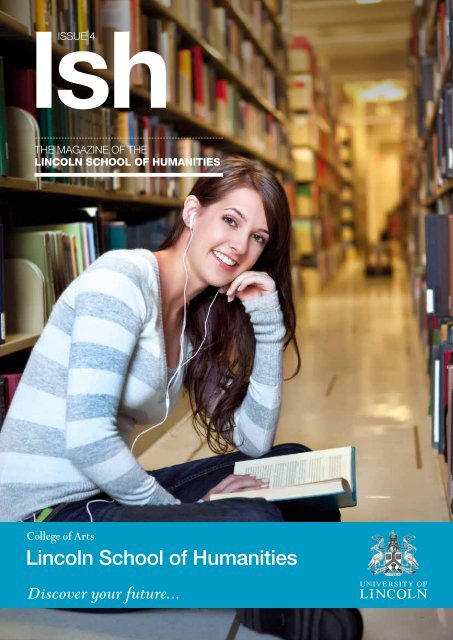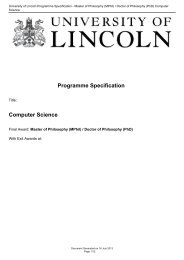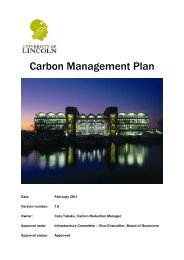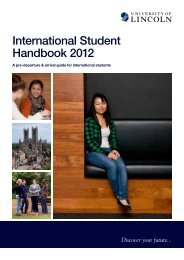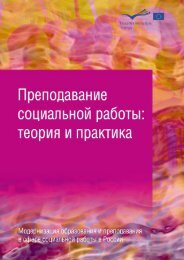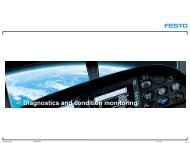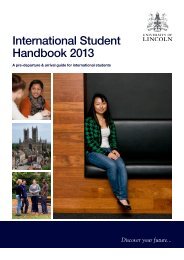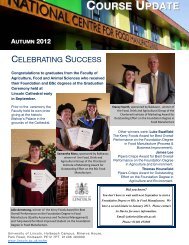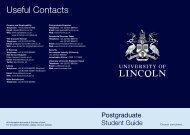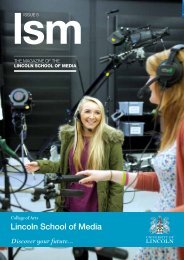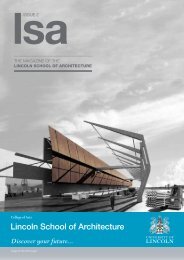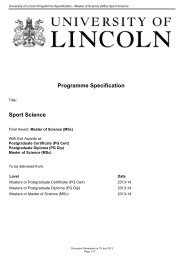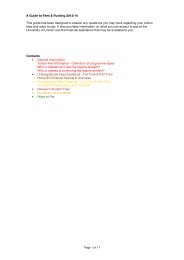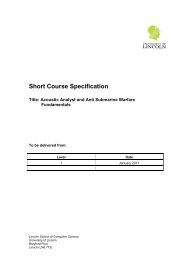LSH Magazine Issue 4 (PDF) - University of Lincoln
LSH Magazine Issue 4 (PDF) - University of Lincoln
LSH Magazine Issue 4 (PDF) - University of Lincoln
- No tags were found...
You also want an ePaper? Increase the reach of your titles
YUMPU automatically turns print PDFs into web optimized ePapers that Google loves.
lshISSUE 4The <strong>Magazine</strong> <strong>of</strong> the<strong>Lincoln</strong> School <strong>of</strong> humanitiesCollege <strong>of</strong> Arts<strong>Lincoln</strong> School <strong>of</strong> HumanitiesDiscover your future...
Pr<strong>of</strong>essorNorman CherryPro Vice ChancellorHead <strong>of</strong> the College <strong>of</strong> ArtsWelcome to this latest edition<strong>of</strong> lsh, the magazine <strong>of</strong> the<strong>Lincoln</strong> School <strong>of</strong> Humanities.We are very proud <strong>of</strong> thework which we do here atthe <strong>University</strong> <strong>of</strong> <strong>Lincoln</strong> andthis publication is one <strong>of</strong>the ways in which we canshare at least some <strong>of</strong> ourachievements with you.The <strong>University</strong> <strong>of</strong> <strong>Lincoln</strong> is one <strong>of</strong>the most successful and dynamicHigher Education institutions in thecountry right now and the School<strong>of</strong> Humanities is an important part<strong>of</strong> its success. One <strong>of</strong> six Schoolswithin the College <strong>of</strong> Arts, our strongcommitment to teaching which isinformed by research and scholarshipis a major reason for the popularity<strong>of</strong> our programmes <strong>of</strong> study.The School <strong>of</strong>fers programmes atBachelors, Masters and PhD levelin History and English. Our studentsare taught by an experienced anddedicated team <strong>of</strong> lecturers some<strong>of</strong> whom were part <strong>of</strong> the originalgroup <strong>of</strong> academics which helpedto establish the <strong>University</strong>. Othershave joined more recently, attractedby our investment in staff and otherresources, drawn here, like ourstudents, by the atmosphere <strong>of</strong>innovation and adventure.History students are invited toexplore a range <strong>of</strong> periods from themedieval to the modern. English issimilarly broad in its scope, <strong>of</strong>feringengagement with a diversity <strong>of</strong> periodsand literary forms. Research in theSchool reflects this rich diversity: ouracademics are highly respected asteachers, but also in their fields <strong>of</strong>study, contributing books, papers,and broadcasts on the national andinternational stages. In recent yearsthe School has also hosted a number<strong>of</strong> major conferences, drawingrespected and well known scholarsto <strong>Lincoln</strong> from across the world.Our waterfront setting on the RomanHarbour known as Brayford Pool andthe towering presence <strong>of</strong> the city’smedieval Cathedral make <strong>Lincoln</strong> aunique place to study and to live.I very much hope that you will enjoyreading lsh and that it will give yousome insight into our varied activitiesand the opportunities which the<strong>University</strong> provides for its studentsand staff.WHYCHOOSE<strong>LSH</strong>?The <strong>Lincoln</strong> School <strong>of</strong> Humanities consists <strong>of</strong> English and History.These two subjects not only develop vital employment andpr<strong>of</strong>essional skills but have also become an essential way <strong>of</strong> exploringour humanity – <strong>of</strong> questioning and debating our idea <strong>of</strong> who orwhat we are and how our values and attitudes have been formed.CONTENTS4 BA (Hons) English... 5 English Joint Degrees... 6 Conference Scene... 8 BA (Hons) History...9 History Joint Degrees...10 Meet the team... 12 MA Historical Studies...13 MA Medieval Studies...14 MA English Studies... 15 MA 21st Century Literature... 16 MA Creative Writing... 17 Trip to Newstead Abbey...18 Staff Publication... 19 Graduation Ceremonies...<strong>Lincoln</strong>, though situated in an ancientcity, is a young university. In the yearssince our courses were launched atthe university they have gone fromstrength to strength. We now havenearly 300 undergraduates a yearon our programmes and a strongand enthusiastic group <strong>of</strong> staff.Our members <strong>of</strong> staff areunquestionably our greatest asset.We in the Humanities subjects at<strong>Lincoln</strong> have always prided ourselveson our attention, openness andcommitment to our students, andthat is a commitment that will notchange. This is confirmed by ourconsistently high National StudentSurvey results and by recent dramaticadvances up the university leaguetables. We have recently been joinedby new members <strong>of</strong> staff and planto appoint more in the coming year.Despite being a new university and arelatively small School we also havean increasingly strong research pr<strong>of</strong>ile.History achieved an excellent resultin the last round <strong>of</strong> the government’sResearch Assessment Exercise; thissuccess has helped promote theestablishment <strong>of</strong> a rapidly-expandinggroup <strong>of</strong> medieval historians, withclose links to <strong>Lincoln</strong>’s city andmedieval Cathedral. English hashighly research active staff in areasas diverse as Shakespeare andhis contemporaries, environmentalliterature, 21st century fiction, traumatheory, life writing and utopian drama.One <strong>of</strong> the advantages <strong>of</strong> being anew university is the ability to adaptand innovate. The undergraduateprogrammes we run are all the result<strong>of</strong> innovative thinking about oursubjects and combine academicrigour with an engaging and livelyapproach to contemporary study <strong>of</strong>the humanities. Our postgraduateprogrammes <strong>of</strong>fer radically distinctiveintroductions to scholarship andresearch in our subjects. We havelong established MA programmesin English Studies, Creative Writingand in Historical Studies, and twonew ones in Medieval Studies and21st Century Literature. You canread about these on pages 12-16.All our courses are well knownsubjects that are recognized andrespected by employers. The skillswe develop - writing, communication,analysis, research, organization,group work – are more vital thanever in pr<strong>of</strong>essional employment.2 3
BA (Hons)EnglishThe English syllabus at <strong>Lincoln</strong> islively and contemporary. It <strong>of</strong>fersstudents the opportunity to engagewith the classics <strong>of</strong> English literature,but we also make space for the textsand ideas that are happening now.We have a research focus on 21stcentury literature and during theirtime here, English students can studypost-colonial writing, popular culture,American literature, contemporarydrama, ecocriticism, gothic literatureand film, life writing and critical theory.They even have a chance to becomeEnglish is a subject <strong>of</strong> big ideas, andthe English programme at <strong>Lincoln</strong>doesn’t shy away from askingchallenging questions about identity,gender, representation, difference,and the individual’s relationshipto the world. All these issues areraised by studying literary works thatcan be provocative, strange, andbeautiful - <strong>of</strong>ten all at the same time.part <strong>of</strong> the literary tradition themselvesby taking our creative writing modules.As for employment after graduation,all the evidence is that skills basedon writing are essential to most formsand all levels <strong>of</strong> pr<strong>of</strong>essional work,and that this is <strong>of</strong>ten more importantthan narrow vocational training. Whenthey graduate, our students are ableto read closely and discriminately;to write concisely and convincingly;to present information in a confidentand organised manner; and to thinkdeeply and critically about anyissue they encounter. They go onto careers in fields as varied asteaching, publishing, journalism,advertising, and public relations.<strong>Lincoln</strong> is a great place to studyEnglish. English staff at <strong>Lincoln</strong> pridethemselves on their approachabilityand availability. But don’t just takeour word for it: come and talk toour students at an open day.<strong>Lincoln</strong> EnglishEnglish joint degreesEnglish can be combined in exciting andunexpected ways with a range <strong>of</strong> other subjects.At <strong>Lincoln</strong> students have theopportunity to study English withDrama, History and Journalism. Witha joint degree students have thefreedom to explore both subjects andexamine the relationship between thetwo. They will encounter a stimulatingvariety <strong>of</strong> texts and approachesin their English studies, includingliterature from the eighteenth centuryto the contemporary moment, postcolonialstudies and critical theory,and options in film and popularculture. By combining English withStaff pr<strong>of</strong>ile:Dr Christopher MarlowProgramme LeaderBA (Hons) EnglishDrama, students can work creativelyand practically as well as critically.Choosing to study Journalism withEnglish allows students to developpr<strong>of</strong>essional journalistic skills alongsidetheir literary studies, and historical andcultural questions can be exploredfrom a range <strong>of</strong> perspectives bystudying English with History. It is thisbreadth and flexibility that make a jointdegree an ideal choice for studentslooking for the best <strong>of</strong> both worlds.I was born and grew up in the WestMidlands, and did my undergraduatedegree at Royal Holloway, <strong>University</strong> <strong>of</strong>London. After completing an MA andPhD at Cardiff <strong>University</strong>, I joined the<strong>University</strong> <strong>of</strong> <strong>Lincoln</strong> in 2003. My PhDthesis was on the representation <strong>of</strong>friendship in Renaissance poetry anddrama, and I continue to be fascinatedby the literature and culture <strong>of</strong> thesixteenth and seventeenth centuries.For me, this is the most exciting period <strong>of</strong>literary endeavour in English, a time whennew forms and genres <strong>of</strong> writing werebeing called into existence with dizzyingspeed. In the first half <strong>of</strong> the seventeenthcentury alone writers <strong>of</strong> the calibre <strong>of</strong>Shakespeare, Jonson, Donne, Herbertand Milton were creating innovativeworks <strong>of</strong> literature that continue toinspire and challenge readers today.Most <strong>of</strong> my teaching is in the area<strong>of</strong> seventeenth-century writing. I runan optional third-year module onShakespeare, and two optional secondyearmodules - Renaissance Literatureand Restoration Literature - that explorethe founding moments <strong>of</strong> literature inthe modern English language. I enjoyencouraging students to recognizeboth the familiarity and the strangenessapparent in the writing <strong>of</strong> the past. Many<strong>of</strong> my publications deal with this issuetoo, including my most recent work onRenaissance student drama. I also havea research interest in representations<strong>of</strong> the future, particularly the future asimagined by the television programmeDoctor Who.4Student view:Natasha O’BrienBA (Hons) EnglishStudying English at <strong>Lincoln</strong> has beena life changing experience. From theRenaissance to Twenty First Centuryliteratures, the course caters for allinterests and exposes you to areas <strong>of</strong>literary study that are not as mainstream.An aspect I enjoyed in the secondyear was a module called ‘PostcolonialLiterature’. Being able to read texts thatwere written back in the British Empirewas fascinating, as it showed howthe history <strong>of</strong> the Empire has helpedshape the face and voice <strong>of</strong> modernEnglish literature. The course also aidsand develops valuable skills such asorganisation and team working as themethods <strong>of</strong> study and assessmentare varied for each module. ModernDrama for instance gave me the chanceto do a small performance as part <strong>of</strong>an assessment. Now that I am a thirdyear student, I can fully appreciate thehelp that the English tutors provide.Their support and knowledge is trulyinspirational and without their enthusiasm,the course would not be the same. I willbe very sad to leave <strong>Lincoln</strong> but it hasgiven me the best English foundationsto help further my career as a teacher.Who knows, I may one day be backfor a Masters. Thank you <strong>University</strong><strong>of</strong> <strong>Lincoln</strong> English!Student view:Samuel WhewallBA (Hons) EnglishThe way the English course at <strong>Lincoln</strong>is structured has allowed me todevelop my own style <strong>of</strong> learning andresearch with the constant direction andencouragement <strong>of</strong> a dedicated team <strong>of</strong>tutors and staff. Starting a degree coursewas undoubtedly a daunting prospect,but the introductory lectures andmodules included in Level One madethe transition into Higher Education acomfortable one. The most appealingaspect <strong>of</strong> the course is the variety <strong>of</strong>literature that its students are introducedto during their three years; the diversity<strong>of</strong> the texts included has openedup my mind to a multitude <strong>of</strong> literaryforms and styles, allowing well informeddecision making when narrowing downmy area <strong>of</strong> study at Level Two andThree. Having secured a permanentrole with the <strong>University</strong>’s MarketingDept. upon completion <strong>of</strong> the course,I can confidently say that the Englishcourse at <strong>Lincoln</strong> has equipped mewith a widely transferable skill set andhas significantly improved the potentialI have as an employable graduate.5
InterrogatingMaggie GeeConferenceConference poster design by Anthony Levings6Trauma in theHumanitiesA unique and ground-breaking conferencewas hosted by a team <strong>of</strong> Humanities staffand English postgraduate studentsover four days last Summer.This innovative event - ‘InterrogatingTrauma in the Humanities’ - wasintended to critically evaluate the rapidlyevolving nature <strong>of</strong> literary and culturaltrauma studies and their conjunctionwith the new discipline <strong>of</strong> the MedicalHumanities. This exciting Internationaland Interdisciplinary event boughttogether contributors from academicand clinical backgrounds from as faraway as America and Belarus. Theorganising committee were delightedto welcome as keynote speakers three<strong>of</strong> our foremost contemporary traumascholars, Pr<strong>of</strong>essor Cathy Caruth (Frank.H.T Rhodes Pr<strong>of</strong>essor <strong>of</strong> HumaneLetters, Cornell <strong>University</strong>), Dr. KaliTal (Research Institute for Social andPreventative Medicine, Bern), and Dr.Anne Whitehead, literary trauma theorist2nd International Conference, July 2012, <strong>University</strong> <strong>of</strong> <strong>Lincoln</strong>‘What Happens Now’, the 2ndInternational Conference on 21st centurywriting in English took place betweenthe 16-18 July 2012 at the <strong>University</strong> <strong>of</strong><strong>Lincoln</strong>. Organised by Siân Adiseshiahand Rupert Hildyard from English in theSchool <strong>of</strong> Humanities, the conferencewas attended by some ninety delegatesfrom fourteen different countries, includingJapan, South Korea, China, India,Canada, USA, Turkey, Hungary, Italy,Germany and seven delegates came fromSpain (five <strong>of</strong> whom had come to the firstconference in 2010). Sixty two paperswere given at the conference, includingand Medical Humanist (<strong>University</strong><strong>of</strong> Newcastle). The highlight <strong>of</strong>the conference was a RoundTable discussion in which allthree keynotes enthusiasticallyparticipated in a ‘QuestionTime’ style debate regardingthe future <strong>of</strong> this complexand diverse field in relation tointersections between science and thehumanities. Papers explored divergentareas such as drama, history, literature,film and clinical practice. Selectedpapers will appear in a forthcomingvolume, edited by Catherine and PhilipRedpath from the department <strong>of</strong> English,to be published by Cambridge ScholarsPress which, it is hoped, will be the firstHumanities based anthology <strong>of</strong> this kind.six from colleagues and postgraduatesin the School <strong>of</strong> Humanities, generatinglively debate about what is happeningnow in 21st century literature. Theguest speakers to the conference werethe Scottish poet and writer KathleenJamie, Tishani Doshi from Madras inIndia, and Ge<strong>of</strong>f Dyer one <strong>of</strong> the mostinnovative prose writers in Britain today.Complementary plenary keynotes weregiven by Pr<strong>of</strong>essor Peter Boxall <strong>of</strong> the<strong>University</strong> <strong>of</strong> Sussex and Dr Rachel Carroll<strong>of</strong> Teeside <strong>University</strong>, the former a wideranging discussion <strong>of</strong> the future <strong>of</strong> thenovel in the wake <strong>of</strong> postmodernism,Trauma delegates at theBishops’ PalaceWhat Happens Now:21st Century Writing in EnglishTishani Doshi giving a reading atthe What Happens Now conferenceand the latter a close study <strong>of</strong> JulianBarnes’ Booker-winning The Sense <strong>of</strong>an Ending focussing on disability asan issue in 21st century literature. Theconference confirmed the vitality <strong>of</strong> 21stcentury literature and the leading roletaken by <strong>Lincoln</strong> in research and debateabout this growing area <strong>of</strong> literary studies.A selection <strong>of</strong> papers based on theconference presentations will appear in aspecial issue <strong>of</strong> the journal C21 Literaturein September 2013. A third conferencewill take place in 2014.In August 2012 Dr Caroline Edwards, Lecturer inEnglish, co-organised the two-day international‘Maggie Gee Conference’ with Dr Sarah Dillon at the<strong>University</strong> <strong>of</strong> St Andrews. Dedicated to the criticallyacclaimedBritish novelist Maggie Gee, the conferencefeatured keynote papers by Pr<strong>of</strong>essor Susan AliceFischer from the City <strong>University</strong> <strong>of</strong> New York and DrJohn Sears from Manchester Metropolitan <strong>University</strong>,Weird CouncilAn International Conference on theWriting <strong>of</strong> China MiévilleThe School <strong>of</strong> Humanities was also actively involvedin another conference outside <strong>of</strong> <strong>Lincoln</strong> in the lastyear. In September 2012, <strong>Lincoln</strong> co-sponsored‘Weird Council: An International Conference on theWriting <strong>of</strong> China Miéville’ at Senate House in London.This prestigious two-day international conferenceattracted some <strong>of</strong> the most significant academics inscience fiction and fantasy scholarship from aroundthe world, including Pr<strong>of</strong>essor Sherryl Vint (<strong>University</strong><strong>of</strong> California, Riverside), Pr<strong>of</strong>essor Neil Easterbook(Texas Christian <strong>University</strong>), Pr<strong>of</strong>essor John Rieder(<strong>University</strong> <strong>of</strong> Hawai’i at Manoa), Dr Paul March-Russell (<strong>University</strong> <strong>of</strong> Kent), and Dr Joe Sutliff Sanders(Kansas State <strong>University</strong>), as well as Miéville himself.Delegates discussed the fiction and academicliterature <strong>of</strong> the multi-award-winning cult British writerChina Miéville, who has been described as ‘one <strong>of</strong>the most influential writers [working] in any genrein the UK.’ Co-organised by Dr Caroline Edwardsand Dr Tony Venezia from Birkbeck, the conferenceBuilding on this influential event in science fictionand fantasy scholarship, the School hosted a similarconference on British science fiction author AdamRoberts in April 2013, titled ‘New Genre Army: AnInternational Conference on the Writing <strong>of</strong> AdamRoberts.’ Co-organised by PhD student ChristosCallow Jr and Dr Caroline Edwards, New GenreArmy welcomed some <strong>of</strong> the leading scholars inscience fiction to <strong>Lincoln</strong>, including Pr<strong>of</strong>essor FarahMendelsohn (Anglia Ruskin <strong>University</strong>), Dr Andrewas well as a reading by Gee herself who was presentthroughout all <strong>of</strong> the academic papers delivered overthe two days. The discussions addressed questions<strong>of</strong> genre in Gee’s work, her political and environmentalactivism, gender politics, ethnic identity, and intergenerationalconflict, and a selection <strong>of</strong> the paperswill be published in 2014 in the edited collectionMaggie Gee: Critical Essays (Gylphi).was a great success andattracted significant onlineattention. In his Guardianarticle dedicated to theevent, Damien Waltersuggested that “WeirdCouncil was remarkablefor many reasons,” arguingthat the conference “<strong>of</strong>fered anexcellent start” in rethinking the literary movement<strong>of</strong> the “weird” – a movement that Miéville has beeninstrumental in extending in recent years in his crossgenreand fantasy novels. An edited collection <strong>of</strong>selected papers from the conference, China Miéville:Critical Essays (Gylphi) co-edited by Dr Edwardsand Dr Venezia, is forthcoming in 2014 and willbe the first scholarly collection on Miéville’s work.Image: ‘Skulltopus’ by China Miéville, used with kind permission.New Genre ArmyAn International Conference onthe Writing <strong>of</strong> Adam RobertsM. Butler (Canterbury Christ Church <strong>University</strong>),Pr<strong>of</strong>essor Edward James (<strong>University</strong> <strong>of</strong> Dublin),Niall Harrison (Editor <strong>of</strong> the leading journal StrangeHorizons), and Damien Walter (the Guardian). Theconference has already been cited in the media as asignificant event and an edited collection <strong>of</strong> selectedpapers delivered at the conference will be publishedas Adam Roberts: Critical Essays (Gylphi), co-editedby Dr Edwards and Christos Callow Jr.7
BA (Hons)HistoryHistory jointdegreesHere at <strong>Lincoln</strong> we <strong>of</strong>fer a History programme which is popularand wide-ranging. The degree covers subjects ranging from themedieval period to the contemporary and from the local to theUS and China, reflecting the broad research interests <strong>of</strong> staff.We think it is important that youdevelop your own interests and thatyou can choose options which exciteyou. After a shared first year, youcan partly build your own pathwaysthrough a range <strong>of</strong> option choicesand start to develop a specialismthrough the Independent Study inyour third year. We have built in theopportunity for you to experience avariety <strong>of</strong> approaches to History, usinga range <strong>of</strong> investigative techniques, forexample oral history and quantitativeand qualitative methods.Our aim is to produce graduateswho are skilled historians with acritical approach to their subject butalso highly employable individuals,with skills in independent thought,the ability to summarise andanalyse critically complex bodies <strong>of</strong>information, to communicate clearlyand concisely in both written and oralformats, and to work under pressureto deadlines either on their own or ingroups. While we try and develop skillsthrough the subject content, we alsomake space for students to preparefor the world <strong>of</strong> work ahead; there is adedicated module for career planningin the second year and a workplacement option to be undertakenbetween the second and third years.<strong>Lincoln</strong> is an ideal location inwhich to study History, and in theprogramme we use its resources fully.Modules include visits to the castleand cathedral, and students areencouraged to use the documentsheld by <strong>Lincoln</strong>shire Archives andthe Cathedral Library.Staff pr<strong>of</strong>ile:Dr Anna Marie RoosSenior Lecturer in HistoryIf you would prefer to study a morebroadly-based programme, one <strong>of</strong>the History joint honours degrees maybe for you. English and History is themost popular <strong>of</strong> these, with manystudents choosing to combine the twohumanities subjects; especially thoseconsidering teaching as a career. Youcan also study History with Politics.In each <strong>of</strong> these programmes youwill find that your two subjects helpBefore I came to <strong>Lincoln</strong>, I was theLister Research Fellow at the <strong>University</strong><strong>of</strong> Oxford, and taught at the <strong>University</strong><strong>of</strong> Minnesota. My husband Ian is a‘yellowbelly’, growing up in Bardney, sowe are coming home. Initially trainingas a biologist, I am a historian <strong>of</strong>science and medicine, specialising inthe early modern period, and teachingmodules about conceptions <strong>of</strong> body anddisease, visual culture, and Renaissancehistoriography. Early scientists wereinterested in everything to do withthe natural world, and so am I. I havewritten one book about how the sunand moon were perceived in earlymodern England, and another aboutearly modern scientific beliefs about salt,called appropriately enough: The Salt<strong>of</strong> the Earth. My most recent book is anintellectual biography about the virtuosicyou understand issues from a widerperspective, both historical andcontemporary. We have ensured thatyou will still get a chance to studyas broad a range <strong>of</strong> topics, periodsand places as the single honoursprogramme, and you will also developthe same skills. You can take yourdissertation in whichever <strong>of</strong> yoursubjects you prefer, so specialisationis equally possible.Dr Martin Lister (1639-1712). Lister wasa royal physician, vice-president <strong>of</strong> theRoyal Society, <strong>Lincoln</strong>shire man, andthe first ‘spider man’ or pr<strong>of</strong>essionalarachnologist. He also wrote a bestselling travel guide to Paris, edited aRoman cookbook, and was a friend<strong>of</strong> Robert Hooke, John Flamsteed,and Samuel Pepys.I greatly enjoy making history accessibleand interesting not only for my students,but also for the general public. I havehad the privilege <strong>of</strong> hosting a televisionprogramme for National Geographicabout Newtonian alchemy, having mywork featured by the journal Nature,and being interviewed on radio andtelevision by the BBC. I am also a Fellow<strong>of</strong> the Linnean Society and the HonorarySecretary <strong>of</strong> the Society for the History<strong>of</strong> Alchemy and Chemistry.Student view:Harriet HornBA (Hons) HistorySince joining the <strong>University</strong> <strong>of</strong> <strong>Lincoln</strong>in September 2011, the History coursehas exceeded my expectations. Notonly is the degree fun and engaging,the lecturers are friendly, dedicatedand approachable making it a lovelyplace to study. The undergraduatecourse here at <strong>Lincoln</strong> gives you theoption <strong>of</strong> a wide range <strong>of</strong> modulesallowing you to advance your existingknowledge and experience somethingnew. I’ve been lucky enough to learnabout a range <strong>of</strong> areas from Americanto Medieval history, areas that I hadbeen oblivious to prior to highereducation. This course not onlyboosted my academic knowledge,it’s greatly improved my confidence,social life and general career outlookas I have been given great opportunitiesand made friendships that will last alifetime. All <strong>of</strong> these things combinedmeans studying History at <strong>Lincoln</strong> wasthe greatest decision I’ve ever madeand I’ve had the best experience <strong>of</strong>my life so far.Antonella completed her first degree inEuropean Languages and Cultures atthe <strong>University</strong> <strong>of</strong> Catania (Italy), beforeundertaking her doctoral researchon Medieval Iberian History, Law andCultural Studies at the <strong>University</strong> <strong>of</strong>Exeter. She worked at the <strong>University</strong><strong>of</strong> Exeter and Queen Mary, <strong>University</strong><strong>of</strong> London, before joining the <strong>University</strong><strong>of</strong> <strong>Lincoln</strong> in 2013.She is interested in the cultural andpolitical history <strong>of</strong> the medieval WesternMediterranean, and in particular inthirteenth-century Iberia. Her mainareas <strong>of</strong> research include the history <strong>of</strong>emotions, social and moral implications<strong>of</strong> interfaith collaborations and politicalagreements, as well as theconnections between friendship andgender relationships, among others.She also worked on the idea andrepresentation <strong>of</strong> power in MedievalCastile and Leon between the eleventhand the thirteenth centuries.She is actively involved in thedevelopment <strong>of</strong> e-learning projectsaimed at enhancing the students’learning experience in medieval studiesat both undergraduate and postgraduatelevels.Staff pr<strong>of</strong>ile:Dr Antonella Liuzzo ScorpoLecturer in History8 9
MEET THE TEAMWant to know who you’ll be taught by when you start at <strong>Lincoln</strong>?Take a look at our gallery <strong>of</strong> people that will be helping you get themost from your time within <strong>LSH</strong>.We’re all happy to answer any questions you may have about the course so get in touch! You can find outmore about us and our areas <strong>of</strong> interest by clicking on the staff link on the website at www.lincoln.ac.uk/lshDr Ian PackerActing Head <strong>of</strong> SchoolE ipacker@lincoln.ac.ukT 01522 837360Pr<strong>of</strong>essor Krista CowmanPr<strong>of</strong>essor <strong>of</strong> HistoryDirector <strong>of</strong> ResearchCollege <strong>of</strong> ArtsE kcowman@lincoln.ac.ukT 01522 886093Dr Siân AdiseshiahReader in English Literatureand DramaProgramme LeaderMA English Studies andMA 21st Century LiteratureE sadiseshiah@lincoln.ac.ukDr Philippa HoskinReader in Medieval HistoryProgramme LeaderMA Medieval StudiesE phoskin@lincoln.ac.ukT 01522 886021Dr Phil RedpathSenior Lecturer in EnglishProgramme LeaderMA Creative WritingE predpath@lincoln.ac.ukT 01522 886185Dr Christopher MarlowSenior Lecturer in EnglishProgramme LeaderBA (Hons) EnglishE cmarlow@lincoln.ac.ukT 01522 837358Dr Amy CulleySenior Lecturer in EnglishE aculley@lincoln.ac.ukT 01522 886048Sue BestwickSenior Lecturer in HistoryE sbestwick@lincoln.ac.ukT 01522 837425Dr Joanna HuntingtonSenior Lecturer in HistoryE jhuntington@lincoln.ac.ukT 01522 886942Michael BlackburnLecturer in EnglishE mblackburn@lincoln.ac.ukT 01522 837109Dr Cairo HickmanSenior Lecturer in HistoryProgramme LeaderBA (Hons) HistoryE chickman@lincoln.ac.ukT 01522 886796Dr Kate HillPrincipal Lecturer in HistoryProgramme LeaderMA Historical StudiesE khill@lincoln.ac.ukT 01522 886125Dr Pietro DipaolaSenior Lecturer in HistoryE pdipaola@lincoln.ac.ukT 01522 886682Crystal WalkerSenior Lecturer in HistoryE cwalker@lincoln.ac.ukT 01522 837064Dr Antonella Liuzzo ScorpoLecturer in HistoryE aliuzzoscorpo@lincoln.ac.ukT 01522 886340Dr Erin BellSenior Lecturer in HistoryE ebell@lincoln.ac.ukT 01522 886941Dr Rupert HildyardPrincipal Lecturer in EnglishE rhildyard@lincoln.ac.ukT 01522 886070Dr Jamie WoodLecturer in HistoryE jwood@lincoln.ac.ukT 01522 837389Dr Agnes WoolleyLecturer in EnglishE awoolley@lincoln.ac.ukT 01522 886340Catherine RedpathSenior Lecturer in EnglishE credpath@lincoln.ac.ukT 01522 886813Dr Anna Marie RoosSenior Lecturer in HistoryE aroos@lincoln.ac.ukT 01522 886340Dr Finn PollardSenior Lecturer in Historyand American StudiesE fpollard@lincoln.ac.ukT 01522 886692Dr Rebecca StylerSenior Lecturer in EnglishE rstyler@lincoln.ac.ukT 01522 886340Harry ZieglerSenior Lecturer in HistoryE hziegler@lincoln.ac.ukT 01522 886208Alex Anthony-LewczukSenior LecturerE alewczuk@lincoln.ac.ukT 01522 886245Dr Peter ShinnerSenior Lecturer in HistoryE pshinner@lincoln.ac.ukT 01522 837367Dr Martin EveLecturer in EnglishE meve@lincoln.ac.ukT 01522 8861741011
MAMAHistorical StudiesThe MA in Historical Studies introduces students to a range <strong>of</strong> newand exciting approaches to studying the past that have emerged inrecent years.Students study core modules onResearch Methods and Approachesto Historical Inquiry. A range <strong>of</strong> optionalchoices then allows students todevelop their own specialised interestsacross a range <strong>of</strong> historical themes,including medieval, early modernand modern British, European andAmerican history. The course alsohelps students develop a variety <strong>of</strong>skills that enable them to undertaketheir own research projects, leadingto a 15-20,000 word dissertationon a topic <strong>of</strong> their own choice. The<strong>University</strong> <strong>of</strong> <strong>Lincoln</strong> is ideally placedfor students’ research interests, witheasy access to a wide range <strong>of</strong> archivalsources at <strong>Lincoln</strong>shire Archives,<strong>Lincoln</strong> Cathedral Library and<strong>Lincoln</strong> Central Library.Medieval StudiesThe MA in Medieval Studies encourages students to explore the depthand breadth <strong>of</strong> resources available in the medieval city <strong>of</strong> <strong>Lincoln</strong> –home to one <strong>of</strong> the few surviving original copies <strong>of</strong> the Magna Cartaand to one <strong>of</strong> the greatest medieval cathedrals in the country.Historical archives, literary manuscriptsand the built environment are all usedto introduce students to advancedstudy <strong>of</strong> the Middle Ages. The coursealso makes use <strong>of</strong> the remarkablerange <strong>of</strong> medieval archives in <strong>Lincoln</strong>,to teach skills such as palaeographyand to explore the economic, socialand religious history <strong>of</strong> England.The wealth <strong>of</strong> literary manuscriptsat <strong>Lincoln</strong> Cathedral, including one<strong>of</strong> only fifty full manuscripts <strong>of</strong> theCanterbury Tales and the ThorntonRomances containing the earliestknown account <strong>of</strong> King Arthur’sdeath, supports modules in medievalliterature and Arthurian studies.Historical modules consider Englishecclesiastical history with a localfocus on <strong>Lincoln</strong>, the largest medievaldiocese, medieval concepts <strong>of</strong> timeand space and how these developed,and theories <strong>of</strong> gender, particularlymedieval concepts <strong>of</strong> masculinity.Cultural studies forms an importantand unique part <strong>of</strong> this programme:students can consider the enduringlegend <strong>of</strong> King Arthur, deconstructinghis image as ideal ruler andreconsidering him in his social context,or the beginnings <strong>of</strong> medievalism inthe Renaissance in their consideration<strong>of</strong> medieval literature. They will havethe opportunity to pursue their ownparticular interests through theirfinal dissertation.Reproduced by kind permission <strong>of</strong> the Dean and Chapter <strong>of</strong> Herefordand the Hereford Mappa Mundi Trustees www.herefordcathedral.orgStudent view:Darren CookeBA (Hons) History 2009-12MA Historical Studies2012-13To come to <strong>Lincoln</strong> <strong>University</strong> to studyHistory was a logical decision; the cityitself has a fascinating history, with thecastle and cathedral at the top <strong>of</strong> thehill providing a consistently impressivevisual reminder <strong>of</strong> the past. Alongsidethis, the facilities and staff present atthe <strong>University</strong> <strong>of</strong>fer a flexible and alwaysinteresting experience <strong>of</strong> learning aboutthe past - in particular, I found thefriendly and enthusiastic nature <strong>of</strong> mytutors made the transition from A-Levelto higher education effortless. Outside<strong>of</strong> my course, the vibrant social life thatthe city <strong>of</strong>fers meant I made long-lastingfriendships and had a fantastic timedoing so.I enjoyed the three years as anundergraduate so much that I continuedonto the MA to further develop my skillsin a more critical learning environment.In the process, I have discoverednew avenues <strong>of</strong> historical interest thatI aim to pursue further in the next fewyears, and gained the confidence andqualifications needed to progress inan extremely competitive field <strong>of</strong> study.Student view:Jayne McMathMA Medieval StudiesMy decision to enrol on the MedievalStudies course was influenced bythe wealth <strong>of</strong> resources available inthe Cathedral Library and the CountyArchives <strong>of</strong> <strong>Lincoln</strong>, as well as thebeautiful historical setting <strong>of</strong> the city itself.It is a great asset to be able to study parttime over two years which fits in well withwork and family commitments. I havefound the compulsory modules, HistoricalResearch and Palaeography a real aidto research. There are a wide range<strong>of</strong> modules to choose from, coveringthe entire Medieval period, which to acertain extent can be chosen to suityour preferred method <strong>of</strong> assessment,ie assignment; exam or presentation.Palaeography and Latin seminarsprovide a great basis for the deciphering<strong>of</strong> medieval documents and there isscope to pursue areas <strong>of</strong> personalinterest within the assignments,projects and especially the dissertation.As well as the weekly seminarsthere is the chance to attend extracurricular lectures and workshops,which provide additional interest andawareness <strong>of</strong> research opportunities.Every module, whether compulsoryor personal choice, is backed upby expert support and guidance.Kate has worked at the <strong>University</strong> <strong>of</strong><strong>Lincoln</strong> since 1995, and specialises inBritish social and cultural history <strong>of</strong> thenineteenth century. She is particularlyinterested in the history <strong>of</strong> museumsand how that illuminates both thecultural issues <strong>of</strong> the Victorian period,and the issues facing museums today.Her books include Culture and Classin English Public Museums 1850-1914(2005) and Museums and Biographies(2012). She is Chair <strong>of</strong> the Museums andGalleries History Group and a founder <strong>of</strong>the Midlands Interdisciplinary VictorianStudies Seminar. On the HistoricalStudies MA she co-ordinates the coreResearch Methods module and also<strong>of</strong>fers the popular option, History andthe Public. She has supervised a number<strong>of</strong> MA dissertations on cultural history,and is also currently supervising threePhD students.Staff pr<strong>of</strong>ile:I’m a historian <strong>of</strong> late antiqueand early medieval Spain and theMediterranean. My research focuseson the transmission <strong>of</strong> knowledgeand identity from the ancient to themedieval world via two processes:history-writing and education. I’vedone a lot <strong>of</strong> work on Isidore <strong>of</strong> Seville,a Spanish bishop (and the patronsaint <strong>of</strong> the Internet) who wrote abook called the Etymologies, a sort <strong>of</strong>Wikipedia for the early middle ages. Atthe moment I’m developing a projectthat explores the role <strong>of</strong> violence inthe schools and monasteries <strong>of</strong> thelater Roman Empire. I’ve previouslytaught in History, Classics and AncientHistory, and Religions and Theologyat the Universities <strong>of</strong> Manchester,Liverpool, Warwick and Sheffield, andhave done a lot <strong>of</strong> research into theuse <strong>of</strong> innovative methods for teachingHumanities subjects. I’m really lookingforward to leading new modules nextsemester called The Rise <strong>of</strong> Islam andThe Goths: Barbarians through time.Staff pr<strong>of</strong>ile:Dr Kate HillDr Jamie WoodProgramme LeaderLecturer in History12 MA Historical Studies1312th century paintings in the royal pantheon <strong>of</strong> San Isidoro in Leon, Spain
MAMAEnglish Studies21st Century LiteratureThe MA in English Studies is anestablished Master’s programme thathas been running since 2007. It is aflexible course, providing the freedomto develop your own academic interestsby specialising simultaneously in severalareas <strong>of</strong> English Studies or developinga more sustained focus on a particularperiod, genre or theme.Several English lecturers are expertsin contemporary literature, which isreflected in the ‘English Now’ coremodules on fiction, poetry, dramaand life writing produced since2000. But there is also expertise inRenaissance literature, the eighteenthcentury and Victorian literature, whichis demonstrated in the historicaloptions <strong>of</strong>fered on this programme.Students choose two modules froma list <strong>of</strong> options, which currently includeRenaissance poetry; late eighteenth andnineteenth century life writing; poetryin the nineteenth century; visual andmaterial culture in the nineteenth century;literature <strong>of</strong> the Thatcher era; utopianand dystopian writing; contemporaryAmerican fiction; and ecocriticism.The final element <strong>of</strong> the programmeis a 15,000-word dissertation on atopic <strong>of</strong> the student’s choice, writtenduring the summer and supported bya dissertation supervisor.The MA can be studied full or part-time,and all teaching is scheduled on oneday per week– Wednesday – makingthe degree ideal for those with work orfamily commitments. After graduation,many <strong>of</strong> our MA students stay with usto study at PhD level.This ground-breaking new MA in 21stcentury literature is the first master’sprogramme in the UK and probably theworld, entirely focussed on literaturepublished since 2000. A great deal <strong>of</strong>lively, troubling and engaging writinghas already been produced in the 21stcentury, and studying literature thatis genuinely contemporary raisesfascinating and important challenges.The ‘English Now’ modules, sharedwith the MA in English Studies, exploresome <strong>of</strong> the writing produced inthe first decade <strong>of</strong> the new millennium.This includes poetry by John Burnside,Daljit Nagra and Kathleen Jamie, dramaby Martin McDonagh, Caryl Churchill,Alecky Blythe and Mark Ravenhill, fictionby David Peace, Ali Smith andNadeem Aslam, and life writing byAlexander Masters, Lorna Sage,and Colm Toibin. The option modulescover an exciting range <strong>of</strong> topics andgenres from 21st century literary theory,contemporary literary representations <strong>of</strong>London, 21st century women’s writing,postmillennial short stories, the neo-Victorian novel, contemporary Americanfiction, utopian and dystopian writing,literature and Thatcherism, ecocriticism,and reading trauma in the 21st century.Students are required to write their15,000 word dissertation on 21stcentury texts or topics.Students can choose to study this MA fullor part-time and all teaching takes placeon one day per week – Wednesday -which makes this programme particularlyattractive to those with employmentor family commitments.MA students will join a vibrant 21stcenturyresearch culture, which includesthe hosting by <strong>Lincoln</strong> <strong>of</strong> the ‘InterrogatingTrauma in the Humanities’ and thefirst two ‘What Happens Now: 21stCentury Writing in English’ Internationalconferences; <strong>Lincoln</strong>’s ‘21st CenturyResearch Group’; the involvement <strong>of</strong><strong>Lincoln</strong> English staff in new academicjournal, C21 Literature: A Journal <strong>of</strong> 21stcenturyWritings; and Siân Adiseshiahand Rupert Hildyard’s editorship <strong>of</strong> newbook, Twenty-First Century Fiction: WhatHappens Now, Palgrave, 2013.Interested applicants for both the MA English Studies and MA 21st Century Literatureare invited to contact Dr Siân Adiseshiah, via sadiseshiah@lincoln.ac.ukFor more information, have a look at our blog: http://maenglish.blogs.lincoln.ac.uk.<strong>Lincoln</strong> EnglishStudent view:Carolyn EmeryMA English StudiesI chose to take the MA in Englishstudies with the expectation <strong>of</strong> readinga wide range <strong>of</strong> novels and learninghow to understand more aboutmodern literature and its wider context.The course succeeded fully on bothcounts. As well as studying novels,the course included poetry and plays,all <strong>of</strong> which were unfamiliar to me. Iparticularly enjoyed the process <strong>of</strong>writing a dissertation which gave me theopportunity to get my teeth thoroughlystuck into a subject <strong>of</strong> my choice.The focus <strong>of</strong> the course was seminar ledwith the benefit <strong>of</strong> discussing the set textand hearing what other students thought,led by our tutors. It was hard work (the21st century literary theory moduleespecially so!) but as with so much inlife, the more you put into somethingthe more you get out <strong>of</strong> it and Ithoroughly enjoyed the experience.Staff PublicationTwenty-First Century FictionWe are delighted to announce thepublication <strong>of</strong> Twenty-First Century Fiction– the very first book on the 21st centurynovel. 21st-century literary studies is arapidly growing field, in which <strong>Lincoln</strong> isleading the way. The book is a collection<strong>of</strong> exciting critical essays on some <strong>of</strong> themost interesting and innovative writers <strong>of</strong>the new century, such as David Peace, AliSmith, John Burnside, Glen Duncan andMargaret Atwood. It is edited bytwo English lecturers from within <strong>LSH</strong>,Dr Siân Adiseshiah and Dr RupertHildyard, the former <strong>of</strong> whom is theprogramme leader <strong>of</strong> the MA in 21stCentury Literature and the MA inEnglish Studies. The book includesessays by another English academic,Dr Phil Redpath, as well as a colleaguefrom Media, Dr Dean Lockwood.14Booker Reading GroupCarolyn Emery and Tricia StuartWe enjoyed the process <strong>of</strong> readingand then discussing modern literatureso much that we didn’t want it to endafter the course! So we are running a21st century literature reading group(supported by the school <strong>of</strong> Humanities)in Room 102 <strong>of</strong> the <strong>University</strong> Library,5 30pm on the second Wednesday <strong>of</strong>each month. So far we’ve read throughthe 2012 Booker prize shortlist andconcluded that Mantel was a worthy –if safe – winner. The group is aimed for‘lay’ readers (English students shouldhave enough to read!) so that we canall find more in the texts by sharing ourviews. Literary theory does creep in, butwe are not trying to be overtly academic,rather to have a good discussionabout what succeeds – or fails – withthe chosen text. Please email us atbookerreadinggroup@hotmail.co.ukto find out what we’re reading now.I have always enjoyed reading, andthought the course on 21st Centuryliterature at the <strong>University</strong> <strong>of</strong> <strong>Lincoln</strong>would <strong>of</strong>fer the opportunity to read anddiscuss books with like-minded people.The course covered contemporarynovels, poetry and plays and introducedme to authors I already knew as well asones I did not, encouraging me to readnew authors and genres, which was verystimulating. I had not studied formally forover 20 years so the thought <strong>of</strong> writingessays was a bit daunting, after somesupport for the first assignment,I seemed to get the idea.The course also involved deliveringa paper to fellow students at twosymposiums during the year. Thispresented the challenge <strong>of</strong> organisingthoughts, ideas and arguments ina very different way from writing anassignment. It also provided the chanceto hear the ideas and thoughts <strong>of</strong> others.I thoroughly enjoyed all aspects <strong>of</strong>the course.Student view:Tricia ReidMA 21st Century Literature15
MACreative WritingThe MA in Creative Writing is a taught postgraduate programmefor students who are already experienced in writing and isspecifically designed to link theory to practice at several levels.Not only will students have theopportunity to practice differentgenres <strong>of</strong> creative writing as theycompile a portfolio <strong>of</strong> their own work,they will also be required to producea pamphlet which will be electronicallypublished with copyright and ISBN.Complementing these creative units,students will study two ‘English Now’modules which will focus on fiction,life writing, drama and poetry writtenin the UK and Ireland since 2000.Assessments here are designed tohone students’ skills at editing,creating character and dialogue,constructing perspective andwriting within genre.The final piece <strong>of</strong> assessment will be a20000 word piece(s) <strong>of</strong> creative writing.This will take the form <strong>of</strong> a dissertationand will provide students with theopportunity to work on an extensivepiece(s) <strong>of</strong> writing open to the choice<strong>of</strong> the student. Unlike the portfolio,students will be expected here towork within one genre <strong>of</strong> writing.TRIP TONewsteadAbbey16Staff pr<strong>of</strong>ile:Phil Redpath is an academic as well as acreative writer. He is currently completing histhird novel and has recently published his firstcollection <strong>of</strong> poetry.His academic interests inform hiscreative practices which are largelyinvolved with teaching and researchinginto twentieth and twenty-first centuryliterature. Phil teaches creativewriting at level two and three on theundergraduate English degree, and alsoteaches postgraduate creative writing onthe MA and is supervising several PhDsin creative writing. He set up creativewriting at undergraduate level eighteenyears ago and has been involved in allthe developments in creative writing atthe <strong>University</strong> since. Phil remains activelyengaged in academic research andhis work is currently being publishedin Britain, Europe and America.In May a group <strong>of</strong> English studentsand staff visited Newstead Abbey,former home <strong>of</strong> the Romantic poetLord Byron, on a trip funded bythe School <strong>of</strong> Humanities.The group toured the historic Abbey and explored its Gothicarchitecture and beautiful gardens as part <strong>of</strong> a third-yearmodule on Romantic and Gothic literature. We were able toview a collection <strong>of</strong> materials relating to Byron’s life and writing,which informed our discussion <strong>of</strong> poems such as ‘Darkness’and ‘Don Juan’ studied as part <strong>of</strong> the module, and the dayended with a literary quiz. It was an enjoyable and informativetrip and a great way for third-year students to mark the finalterm <strong>of</strong> the degree. We’ll be <strong>of</strong>f to Newstead again next spring.Dr Phil RedpathProgramme LeaderMA Creative Writing 17
Staff PublicationPerforming Masculinityin English <strong>University</strong>Drama, 1598-1636Christopher Marlow’s first book, published on5th April 2013, looks at a forgotten area <strong>of</strong> earlymodern literature: drama written and performedby sixteenth- and seventeenth-century studentsat the Universities <strong>of</strong> Oxford and Cambridge.GRADUATION CEREMONIESReferencing early modern English playtexts alongside contemporary records,accounts, and statutes, the book<strong>of</strong>fers an overdue assessment <strong>of</strong> therelationship between the dramatic efforts<strong>of</strong> the universities and early modern maleidentity. Taking into account the nearsingle-sex constitution <strong>of</strong> early modernuniversities, the book argues thatperformances <strong>of</strong> university plays,and student responses to them,were key ways <strong>of</strong> exploring andshaping early modern masculinity.Staff pr<strong>of</strong>ile:Dr Amy CulleySenior Lecturer in EnglishChristopher shows how the plays dealtwith their academic and social contexts,and analyses their responses tocompeting versions <strong>of</strong> masculinity.He also considers the implications<strong>of</strong> university authority and royalpatronage for scholarly performances<strong>of</strong> masculinity; the effect <strong>of</strong> theliterary traditions <strong>of</strong> classical friendshipand platonic love on academicrepresentations <strong>of</strong> male behaviour;and the relationship between universityDr Amy Culley began lecturing at<strong>Lincoln</strong> in 2007, after completing herundergraduate degree at the <strong>University</strong><strong>of</strong> Oxford and her postgraduatestudies at the <strong>University</strong> <strong>of</strong> London.Her research interests are in theliterature <strong>of</strong> the eighteenth century andRomantic period, primarily women’swriting and life writing. She is coeditor<strong>of</strong> an essay collection Women’sLife Writing, 1700-1850: Gender,Genre and Authorship and is currentlyfinishing her book British Women’s LifeWriting 1760-1840 that considers howwomen use autobiography to exploretheir relationships to religious, familial,social, and political communities. Herrecent work has also focussed onthe relationship between history andliterature in the eighteenth centurydrama and masculine initiation rituals.Including discussion <strong>of</strong> the Parnassustrilogy, Club Law and works by ThomasRandolph, William Cartwright, JohnMilton and others, this study shines newlight on long neglected aspects <strong>of</strong> thegolden age <strong>of</strong> English drama.Dr Christopher Marlow is the ProgrammeLeader for BA (Hons) English at the<strong>University</strong> <strong>of</strong> <strong>Lincoln</strong>.and particularly how life writingchallenges conventional historicalnarratives and practices. Theseinterests inform Amy’s teaching ona range <strong>of</strong> undergraduate modules,including Georgian Literature, VictorianLiterature, Women’s Writing and FeministTheory, and Life Writing. She also enjoysteaching across disciplinary boundarieson both the MA in English Studies andMA in Historical Studies in moduleson Nineteenth-Century Life Writingand Poetry. She is looking forwardto contributing to a new undergraduatemodule next year on the Literature<strong>of</strong> Childhood.Although a relatively new <strong>University</strong> established in 2001, you wouldbe forgiven for thinking that we are as old as Oxford, Cambridge orDurham when you attend our Graduation ceremonies.Each <strong>of</strong> the nine ceremonies takes placeover four days at <strong>Lincoln</strong> Cathedral,one <strong>of</strong> the most spectacular graduationvenues in the country. Steeped inhistory, the Cathedral provides the mostincredible backdrop for the culmination<strong>of</strong> our students’ hard work. Full <strong>of</strong>tradition, ceremony and reverence, thiswonderful occasion is the pinnacle <strong>of</strong>three years study for each and everygraduate who attends, watched onproudly by family and friends alike.Prior to graduation, our <strong>LSH</strong> Graduandsbegin the day in the grounds <strong>of</strong> <strong>Lincoln</strong>Castle where gowns are collectedand mortar boards donned, and theyreturn to the castle grounds afterthe graduation ceremony where thecelebrations can start in earnest inthe hospitality marquees.It is also an occasion to mark theachievements <strong>of</strong> notable persons whohave made a major contribution to theirchosen field at national or internationallevel by the awarding <strong>of</strong> an honorarydoctorate. Recent honorands from theHumanities include Inspector Morseauthor Colin Dexter OBE, BritishHistorian Pr<strong>of</strong>essor Paul Langford andArcheologist and writer Michael J. Jones.After graduation, the <strong>LSH</strong> alsomakes some awards <strong>of</strong> its own tograduands who have excelled duringtheir time at <strong>Lincoln</strong> at a specialceremony in the Bishops’ Palacesituated opposite the Cathedral.The awards are presented by theHead <strong>of</strong> School and family and friends<strong>of</strong> the award winners are also invited.1819
College <strong>of</strong> Arts<strong>University</strong> <strong>of</strong> <strong>Lincoln</strong>Brayford Pool<strong>Lincoln</strong> LN6 7TSTelephone +44 (0)1522 886644Fax +44 (0)1522 886880Email enquiries@lincoln.ac.ukwww.lincoln.ac.uk/lsh@<strong>Lincoln</strong>English@ULHistory<strong>University</strong> <strong>of</strong> <strong>Lincoln</strong> (UK) <strong>of</strong>ficial pagePhotography: Phil Crow www.philcrow.com,Electric Egg, Andy Weekes.Design: optimadesign.co.ukAll information correct at time <strong>of</strong> print.For the latest information, please visitour website.


